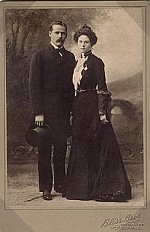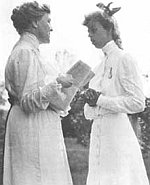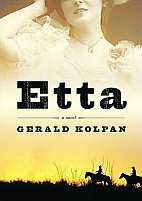HISTORICAL
FICTION |
|
 |
|

Harry Longabaugh (the Sundance Kid) and Etta Place, just before they
headed to South America
|
|

Eleanor Roosevelt and her future mother-in-law Sara Delano Roosevelt in
1904
|
|
BOOK
ILLUMINATIONS
From Merrimon Book Reviews
HOME
ROMANCE
FICTION SUSPENSE & THRILLERS
MYSTERY
AUTHORS REVIEWER
PROFILES
|
Etta

by Gerald Kolpan

The
enigmatic Etta Place: a Western adventure real and imagined
History records very
little about Etta Place, the woman who accompanied Harry Longabaugh,
alias the Sundance Kid, during his outlaw days in the Wild West.
Gerald Kolpan writes a fictional biography of the life of the enigmatic
Etta Place complete with adventure and romance while placing her within
the midst of some of the events of the period. Diaries, newspaper
articles, Wanted notices, memos from the Pinkerton agency and even
personal letters add a sense of narrative excitement and variety to the
more typical straight third person story that binds the various aspects
of the story together. Gerald Kolpan's ETTA places the history of the
emerging west within the context of the larger United States as the
journey
of Etta Place's life moves from location to
location, including Pennsylvania, New York and even Atlanta.
Using historical documents to spur his literary imagination, Gerald
Kolpan creates a work of dramatic adventure that captures the dynamism,
danger and wildness of America's expansion westward.
Despite her more sophisticated upbringing, Etta Place herself can
handle the wildest stallion and her shooting skills rival the best of
men. Forced to flee westward to protect herself when the death of
her father leaves her penniless, Etta Place joins the railroad's
establishment as a Harvey Girl, an elite group of girls known for their
heavenly and sanitary presence in a rough world, giving succor and
comfort to wearied travelers. Just when she becomes settled in
her new life, she finds the need to escape again as scandal destroys
all she has carefully built. Gerald Kolpan presents a
frightening look at the influence of power and wealth behind the
railroad and western towns when even the most independent woman defends
herself from the advances of a man with connections. As the story
progresses, Etta Place joins the Wild Bunch, the notorious gang of
Butch Cassidy, the Sundance Kid and Kid Curry. Etta makes both
friends and enemies as her life takes unexpected turns all the way to
her final escape. Known for a certain kindness and generosity
among friends, some go to extraordinary lengths to protect her.
Others, such as Detective Charles A. Siringo, are just as determined to
bring in the notorious gang of outlaws and thereby maintain the
reputation of the Pinkerton company. Among them, Etta Place has a
reputation of deviousness and danger. She may be a woman, but she
deserves a special warning to beware. Although Etta has become a
thief and outlaw, Gerald Kolpan presents her character in a favorable
light by juxtaposing the actions of the outlaw gang to the avaricious
greed of the railroad establishment. Furthermore, as Etta Place
develops a friendship with Eleanor Roosevelt, the reader sees in Etta
the woman beyond the less savory reputation created by the media of the
day.
Etta Place's relationship with Eleanor Roosevelt is a troublesome point
in the narrative. It is not just the portrayal of Eleanor's
amorous feelings for Etta itself, but rather, the episode changes how
the reader views the rest of the story. Suddenly, the shift
between the appearance of documented history and imagined history
strikes the reader more than any other previous section of the
novel. In the notes at the back of the book, the author discusses
this episode as created out of his imagination, although he refers to
rumors about Eleanor Roosevelt's relationships with other women.
Whatever is the real documented truth, as presented in the context of
this book, Eleanor Roosevelt as a character is somewhat
problematic within the narrative as whole. To those familiar with
the works of Eleanor Roosevelt, interesting parallels between her good
works and Etta's do benefit, resonating in the meeting of these two
characters. Nevertheless, his portrayal of Eleanor Roosevelt weakens
that purpose as she appears as a rather weak character, especially in
comparison to the actual readily known historical figure. At this
particular juncture, everything became suspect in terms of the
historical
period. The narrative fell apart structurally as well. Was there
a Black Hand mafia? What about this or that? These scenes change
how other aspects of the text are read. After
that point, other later scenes read more as tokenism rather than a rich
portrait of the West's diverse population of Chinese
immigrants, American Indians, African Americans, etc. From this
point on, the author often skims over that potential with the mention
of labels in place of the intriguing insights mentioned in his earlier
portrayal of the Harvey Girls or a moving friendship with a Native
American woman. By the time the reader sees the development of
the Sundance Kid's politics, it too feels less powerful and more
fanciful. Despite the tasteful way the author presents this part
of the amorous episodes, some readers, including some Eleanor Roosevelt
fans, will find these scenes troubling despite the author's claims in
the notes. Any parallels intended between Etta and
Roosevelt's mutual concern for the downtrodden would have been better
if the author had given more details of the intellectual and
compassionate affinities shared by the two women.
With a combined sense of history and imagination, ETTA takes the reader on a wild
action-packed, adventurous ride through the emerging and often lawless
West, an adventure supplemented by vignettes of other parts of American
history. Gerald Kolpan paints a fascinating portrait of the
enigmatic Etta Place as a strong woman who is the ultimate spitfire,
not just in her ability to wield a gun and control a horse, but in her
ability to stand up for other women. Parts of this novel such as
the portraits of the Harvey Girls and the Pinkerton Agency are
brilliantly detailed, showing lesser known aspects of Western
history --- but then again, maybe those parts are also
more imagination than historical events? Historical fiction
is, after all, fiction, but this novel would have been better if the
author had given more imaginative development to the scenes where he
shines the most as well as a bit more to the emotional dimension
romance between Etta and the Sundance Kid. As a debut novel, ETTA has much going for it to
recommend. ETTA is a
fun, invigorating, fast-paced adventure that makes for good escapist
reading that touches on all the great Western celebrities from the Wild
Bunch to Annie Oakley. Western historical fiction fans, however,
might leave this book wishing the author had paid as much attention to
more scenes as the finer detailed moments of this book to reach the
great potential clearly shown in Gerald Koplan's debut work of
historical fiction.
Publisher: Ballantine (March 2009)
Reviewed by Merrimon,
Merrimon Book Reviews
Review Courtesy of Amazon Vine

|
|
|